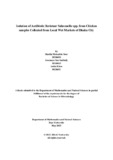Isolation of antibiotic resistant salmonella spp. from chicken samples collected from local wet markets of Dhaka city
Abstract
In Bangladesh poultry chicken is popular as a great protein source but it contains Zoonotic
disease called Salmonellosis causing bacteria like Salmonella spp. Salmonellosis is a
foodborne illness that is brought on by a number of non-typhoidal Salmonella enterica (NTS)
serovars, primarily serovars Enteritidis and Typhimurium. The aim of this project was to
Isolate the Zoonotic disease causing Salmonella and the rate of their antibiotic resistance. For
this purpose 8 poultry Chicken samples were collected from different areas of Dhaka city.
The highest amount of Salmonella isolates were found from flesh and that was 49.5%, then
22.7% came from cloacal swabs and 27.8% came from Liver. Antibiotic susceptibility test of
these isolates was performed by using 10 antibiotics belonging to 7 groups which revealed
that all the isolates (100%) were resistant to Tetracycline, Amoxicillin (93.8%), and
Streptomycin (62.9%). However, commonly used antibiotics Meropenem, Imipenem and
Ceftriaxone were reported to be very effective antibiotics against Salmonella spp. with
sensitivity rates of 93.8%, 78.4% and 67%, respectively. This result indicates that there is a
significant risk of cross-contamination and uncontrol use of different antibiotics to the poultry
chicken. At the final stage PCR and Gel electrophoresis was performed for the Molecular
confirmation of the Salmonella spp.

